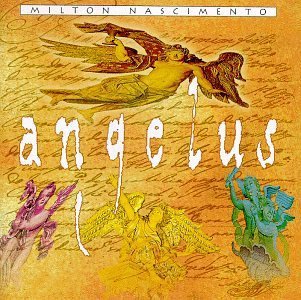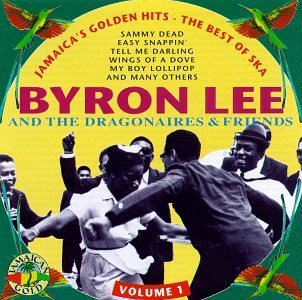One was Angelus, a 1994 album by Milton Nascimento.

I haven't really heard that much of Nascimento's music, but based on my limited exposure I tend to agree (as almost always) with Joe Sixpack's assessment of the guy in his Brazilian Music Guide, and his mini-review of this album is right on the mark: Plenty of Milton's trademark falsetto ululations, framed by predictably lite fusion-pop. Several big name guest stars, including jazzcats Herbie Hancock, Pat Metheny, Wayne Shorter (and others) as well as Peter Gabriel, James Taylor, etc. Some interesting arrangements, but nothing that he hadn't done before. Most pretty cheesy.
There's an offbeat cover of the Beatles' "Hello Goodbye," and the song that J.T. guests on ("Only a Dream in Rio") at least starts off pretty nicely. (I was heavily into Mr. Taylor in my youth, but lost interest around the time he and Carly Simon split up and I discovered punk rock.) Several of the songs on side one of the tape are pretty okay, and I'm sure I'll listen to them again, but the longer the album goes on, the more grating it becomes. Maybe it will grow on me. My friend Heather is a big Milton fan, along with much of the music world and the entire nation of Brazil, so I'm willing to keep an open mind, but so far I don't get it.
More appealing by far was/is Byron Lee and the Dragonaires & Friends, Vol. 1. (There seem to be three volumes in all.) This one's part of a series called "Jamaica's Golden Hits: The Best of Ska" on the Jamaican Gold label, focusing on the transition period between 50s R&B and early-60s ska.

I was pretty sure I recognized Lee's name from various compilations, and the cover art looked promising. Turns out, according to the All Music Guide entry on Lee, he was once the best-known Jamaican musician in the world, even making an appearance in the first James Bond movie, Dr. No. When the first-wave ska craze died down, he fell out of favor (and probably never had that much street cred to begin with) and spent the rest of his career doing covers of popular tunes of the day, from ska to rocksteady to soca.
The compilation I picked up is slightly weird, in that it's a mix of originals, covers, and selections where the original instrumental track has been paired with a new recording of a soundalike vocalist. This explains the opening selection, a cover of Millie Small's "My Boy Lollipop" in which Small has been replaced by what sounds like the Chipmunks. But the oddness is not too distracting; in fact, it's part of the charm. I love the lo-fi quality of the recordings, the energy level is great (and I say this as a man with little or no interest in the great Ska Revival Revival of the mid90s), and it's packed with catchy tunes. Can't wait to take a road trip with this on the car stereo. I was not familiar with the song "Oh Carolina," but fell in love with it immediately, thanks to the innovative use of an aerosol spray can as a percussion instrument (at least that's what I think is going on). There's also an instrumental version of "Ring of Fire" with a different name (actually, only the chorus was "Ring of Fire;" the verses might have been something entirely new). This was particularly intriguing since I first heard it on the way home from watching Walk the Line--a movie I intend to write about here, and soon. But I digress.
All in all, the best expenditure of twenty cents since ... well, I can't really think of anything else that cost that little in years. (A comic book circa 1967? A call from a pay phone in 1979?) Every time I buy a pre-recorded cassette, I figure it may be the last. If that turns out to be the case, I'll have gone out on one high note and one falsetto ululation. Not bad, not bad.
No comments:
Post a Comment